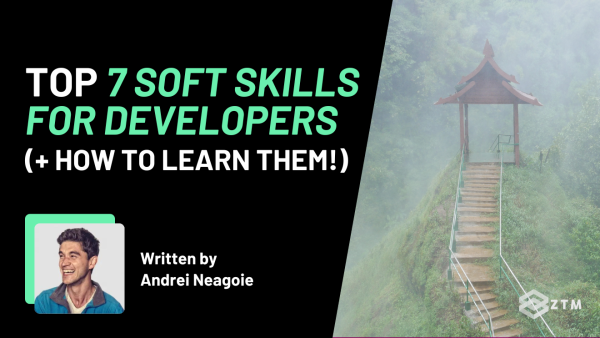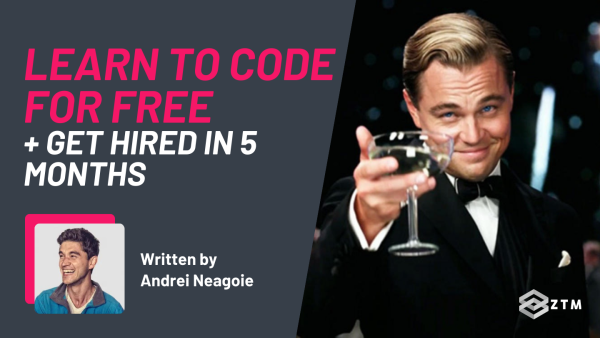Are you trying to learn an in-demand skill like coding, design, or digital marketing?
Well, one of the most important decisions you can make is picking the right platform.
- Get a good one that's updated with all the latest information + a supportive community and you'll have a far higher chance of succeeding
- But choose the wrong one and you can be stuck with bloated, outdated content that won't get you hired
The problem of course is that with so many options out there, it’s easy to get overwhelmed or end up on a site that isn’t a good fit for what you actually need. Some platforms are better for casual learning, while others are built to help you gain real-world skills and get hired.
In this guide, we’ll show you the best Udemy alternatives for serious learners — especially if you’re looking for clear paths, up-to-date content, and platforms that focus on helping you reach an actual outcome.
Why look for a Udemy alternative?
So why not use Udemy?
- It's helped millions of people learn online
- It’s affordable
- Has a huge range of topics
- And makes it easy to pick up new skills
Well, simply because if you’re serious about building real-world, job-ready skills, you might find it falls short.
So let me explain:
The Udemy platform works like a marketplace, where anyone can publish a course. That means quality varies a lot. Some instructors are excellent. Others publish content that’s outdated, shallow, or never updated again. And because Udemy doesn’t vet courses for relevance or freshness, it’s on you to figure out what’s actually up to date.
Even the rating system can be misleading. A course that was great two years ago might still show five stars today, even if the content is now obsolete. In fields like software development, AI, or design, that can waste your time and money.
From the instructor side, the platform’s low pricing and shifting business model have also caused issues. Payouts have dropped, and Udemy now takes a larger cut of each sale. This means there's less motivation to update properly.
And so what happens is some instructors quietly “update” a course just by tweaking a text file so it shows a current date — without changing the actual content. And with Udemy moving more toward corporate licensing, many creators have started leaving the platform altogether.
That’s why more and more learners are turning to platforms that focus on depth, structure, and support — not just volume.
UPDATE: Udemy was just purchased by one of the platforms on this list, so it seems like they might not be an option in the future any more anyway!
The details are still very early but not clear what will happen to any previously purchased courses or how this will affect the instructors on there.
TL;DR
If you're trying to build a real skill set and reach a specific goal, it's worth choosing a platform that’s designed to help you get there. Udemy can be very hit or miss.
The good news is here's 5 alternatives you can check out...
#1. Skillshare

Price: $29 per month or $99 per year, but you can get a month free trial to the paid content.
Pros:
- Creativity. Skillshare primarily focuses on creative courses. Art, Design, Videography, etc, so it’s great if you’re looking for that kind of training
Editor's note: I’m actually taking some of their videography courses right now and the quality is fantastic.

- Coursework. Every course has a project for you to complete, so you can learn and apply the course content.
Studies show that this is far superior to information only teaching, in terms of retention, experience, and completion of training
- Expertise. Each course is taught by acting practitioners, so you’re getting highly valuable, and relevant information
- They have a strict process for quality control. Teachers have to produce to a certain quality or it won’t get on. This includes video, audio, structure, and project
- Offline learning. Their app is incredibly helpful and the UI is great
- Speed. Courses are fairly short, so you can pick up things fast
Cons:
- There’s no community. Sure, you can ask questions under videos but that’s more of a 90’s blog feature and there's no guarantee you'll get an answer. However, it's the best option they have by having such a brand range of courses
- Courses are not always up-to-date. Sometimes a new course will launch, and the old course will still be live also which can be confusing. (However, the industry doesn’t always change that fast in creative topics)
- Too many options. Some topics have multiple teachers and course options which can be overwhelming
- Depth. Due to a lack of specialization, courses normally only go so deep with information, and sometimes miss key information
TL;DR:
Skillshare is a great place if you want to pick up a creative skill at a low cost.
#2. Coursera

Price: It varies, as this platform caters to 3 different audiences.
Some courses are free, but their Coursera Plus program is $399 a year, or $59 a month. (This is also the same price when purchasing for teams, at $399 per user login).
However, not all courses on the platform are part of that $399 offer. This is because Coursera has also partnered with major colleges and universities to provide online qualifications and degrees, which are tens of thousands of dollars each and vary in price.

This way they can offer ‘entry-level’ courses, while also offering degree level qualifications, and get paid $42,000!
Pros:
- Career-focused. If you want to upskill into a job, then you can definitely do that here
- University partnered. That means you can get actual accredited degrees at the end of some of these courses. (If that's important to you or the role you're looking for)
- Large library. 7,000+ courses across many technical fields such as Robotics and Engineering
- Online community. They have their own forum to ask questions and get support on each class
Cons:
- Dear lord, the price! $10,000 - $40,000 for a digital program is just mind blowing. Sure, it’s cheaper than going in person but oh my god that’s a lot of money
- The time frame. Some courses take 3-4 years to complete
- Some courses don’t quite fit the model. How can you practice robotics online? Surely you need access to tools and resources to build the robot?
- Prior knowledge is required. For some courses, you will need a level of education or experience before you can not only understand the content but even apply!
- Enrollment windows. You can only join at certain times of the year

TL;DR:
If you’re looking for career-focused skills, while also earning a degree from the comfort of your own home, then this could be a great option for you.
Other honorable mentions that have a similar platform, pricing and degree model to Coursera, are edX and Future Learn.
However, I would recommend that you look at the industry that you're aiming to work in and then check if your degree is still needed.
Thanks to the growth in digital training, many companies have become more relaxed on requiring a University degree - as long as you can prove that you can actually do the work.
If you think about it, this makes sense. They don't care where you learned, as you’re sitting at home either way - you’re just learning from a different platform. Proving that you're able to do the job is far more important.
This means that you might not need to pay $40,000 for that digital course. You could get the same role for $300 instead, so do your homework.
#3. Masterclass

Price: $15 a month or annual at $180.
They also offer options for adding a 2nd user or family plans, with the price adjusting per added user. (Their Duo plan is $240 a year, so not a 100% increase for the 2nd person.)
Pros:
- Amazing production quality. It feels like you’re watching Netflix on 4k HD (these guys are the definition of "edu-tainment" and they crush it)
- Access. Information from celebrities and VIPs that you would never think to have access to, often talking around areas they have experience in but are not known for.
For example
Amy Poehler is incredibly funny, but she talks about how improv skills helped her be agile in life and adapt to opportunities.
- Cost. Fairly cheap at just $15
Cons:
- No free content
- Courses are varied and not always actionable. Each class does come with a workbook to follow, but the value differs greatly. Some walk you through all the steps, while others are a paragraph of an idea
- Varied end goals. Although there are multiple courses around a topic (with each on a separate focus which is great), there's no real cohesiveness between it all
- No community
TL;DR:
Join Masterclass if you want to get insights into how people you admire have achieved certain goals, and love high-end production quality at a low price.
I like to think of this platform as the “Who would you invite to a dinner party, living or dead” question.
The insights are what I imagine you might get if you sat down for food and picked their brains on a topic. This means that the content is really interesting but you aren't going to get the skills to get hired as a chef (or any job) by learning on here. You will however, be entertained.
#4. LinkedIn Learning

Price: $30 a month, or $180 a year, with a one month free trial.
Pros:
- Certification. Certifications that you can immediately add to your LinkedIn profile (although, I'm not sure how much stock companies put into these)
- Expertise. Instructors have real world experience in their course topics
- Range. Broad range of career focused courses
- Access. You can download lessons for watching offline on the app
- Updated courses where relevant. (Some foundational content is 3+ years old, but the topic hasn’t changed so no need to update). Others updated in the past month
- Community via Linkedin Learning groups
Cons:
- Certificates are accredited by Linkedin themselves. This can be good and bad. Business courses might look great, but topics LinkedIn is not known for might not mean much to employers
- It has a low quality feel. A lot of courses feature stock images and low budget screen capture videos
- Very little project work. Of the 16,000+ courses, only 127 are dedicated to hands-on practice. Others do have some kind of project but it’s hit and miss
- Multiple teachers teaching the same topic. Good for finding new tips. Bad for feeling overwhelmed by not knowing which course you need to take to achieve your goals
TL;DR:
If you’re in an industry that appreciates certifications, then LinkedIn Learning might be a great fit. In fact, during the research for this post, I noticed that some jobs posted on LinkedIn even mention some of these certifications.
However, if you don’t need a ‘LinkedIn’ specific certification, the next option could be better - especially if you want to learn a constantly evolving, high-end skill.
#5. Niche focused platforms

I mentioned up top but Udemy's strengths are also its weaknesses.
Many top instructors are leaving the platform because they can no longer justify their time investment there. Lower profit share for them, mass competition of instructors on most topics, their shift to focusing more on B2B, etc.
Likewise, when there are 100's or even 1,000's of courses all on the same topic, it can cause analysis paralysis when you try to decide which course to take.
So what can we do?
I’ve given a few other Udemy alternatives here but in my personal opinion, the best alternative to Udemy are niche focused sites - especially if you're trying to pick up a skill that changes often.
Why?
Simply because niche focused course platforms get around each of these issues and more, thanks to supply and demand!
Let me explain:
Niche sites attract a smaller audience, but they often charge slightly more due to their specialist knowledge and ability to provide better support to students.
Pair that with the fact that there are usually fewer teachers to compete with (normally one per topic), and suddenly it's a lot more beneficial for the instructor to keep their course updated.
For example
Here at ZTM, we update our courses every year at a minimum but most of them are updated multiple times throughout the year based on student feedback as well as changes in the industry (ex: if there is a major change to a coding framework, our instructor for that topic will immediately start working on updates to the course).

Also, we have a single, definitive course on the topic, and only one teacher per course topic - each of which are industry matter experts, who are actively working in their industry.
This means the content they update is what they want new hires to know, and it’s stuff not being taught in college curriculum (which is very theory based vs. practical skills).
It also means that there is no confusion over which course you should take.
You simply have to decide what career you want to have and then follow the exact courses and steps.
That’s the power of niche focus
As you can see, this niche focus completely bypasses the Udemy issues (and other massive open course platforms) that most people get frustrated with.
You get updated content, with less course overwhelm, a specialist focus and still a reasonable price.
Better still, you can find these type of niche platforms in almost any kind of industry:
The list goes on. All it takes is a quick Google search for the topic you want to learn and course, and you’ll find a bunch of options.
However, because there are so many that don't have the big brand name recognition of these other platforms, you'll definitely want to do your research looking at reviews to make sure it's legit and highly regarded.
Price: Varies on the platform, but usually a recurring low cost monthly fee, with a discount for annual, or, a one-off fee for lifetime access and updates.
Here at Zero To Mastery, you can get unlimited access for just $49 per month, but that drops down to the equivalent of $25 per month if you pay annually ($299 a year).
Considering our specialty is taking people from absolute zero to getting hired in a brand new career, often helping them land jobs making $1,000s more than they were before, you can see how it's worth spending a little bit extra.
Many niche focused platforms are like this, and the benefits stack up.
Pros:
- Niche focused. You’re able to get the best information around a specific goal. It’s not a platform that tries to do everything. It’s one platform that’s dedicated to help you achieve your end goal.
- Updates! Because of this core focus, you’re able to get frequent content updates. This is incredibly important when you’re trying to learn a technical role
- Information quality. Their courses are often created by current working experts (ex: Daniel Bourke). Not only are they using what they’re teaching, but they’re ahead of the curve and sharing what they want people to know before it’s even trending. Compare that to outdated degrees and suddenly you’re gaining skills at a fraction of a cost of school, within months, not years
- Dedicated, specialist community. We keep mentioning community as a benefit, and it’s because studies have shown that a community helps you to stay on track and achieve goals. Even better, is when that community is all dedicated to the same goal

Cons:
- Niche focused. If you want to learn something totally different, you’ll need to go elsewhere
- Do your homework. Not every platform updates often, even though they are in an industry that needs to. Guitar courses probably can go a few years without an update, but an AI course should have been updated in the last 6 months if you want it to be relevant
So which is the best Udemy alternative?
Honestly, it all comes down to what you want to learn:
- Skillshare is great for creative skills
- Coursera can help you get a University degree from home
- Masterclass will let you listen to Noam Chomsky or make you feel like you're watching a Netflix special of Gordon Ramsey cooking eggs
- Linkedin Learning can help you skill up with specific certifications that a job posting might require but the content quality is hit and miss
- While niche focused sites are usually the most up to date and focused on a specific skill. Just be sure to do some initial research (make sure there are lots of reviews and testimonials) and make sure you find a site that specializes, is up to date, and has community support
Hopefully this guide has helped you to decide on the best option for you.
Udemy is still great if you don't have a specific goal in mind and want to learn a wide variety of topics, or if price is the biggest factor for you.
We've also found that many students enjoy different platforms for different reasons so it's possible that you mix and match 2-3 platforms to get the best fit for you.







